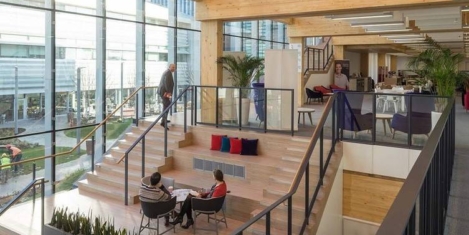October 15, 2018
Review of progress on diversity in boardrooms shows that there is much to do
 Business leaders have been urged by Sir John Parker to step up their work on ethnic and cultural diversity at the top of business. The call to action comes as the Parker Review Committee, led by Sir John Parker, publishes its first annual update to track the progress made against the recommendations in its Final Report, published in October 2017. The Final Report urged business leaders to improve the ethnic and cultural diversity of UK Boards to better reflect their employee base and the communities they serve. It set out achievable objectives and timescales to encourage greater diversity.
Business leaders have been urged by Sir John Parker to step up their work on ethnic and cultural diversity at the top of business. The call to action comes as the Parker Review Committee, led by Sir John Parker, publishes its first annual update to track the progress made against the recommendations in its Final Report, published in October 2017. The Final Report urged business leaders to improve the ethnic and cultural diversity of UK Boards to better reflect their employee base and the communities they serve. It set out achievable objectives and timescales to encourage greater diversity.















 Today is World Mental Health Day and new research from Bupa has found that concerns over mental health is not confined to adults, as a third of employees say they worry about their children’s mental health while at work. The research, conducted among working parents of 4-18 year olds reveals that children’s mental health is among parents’ greatest concerns, on par with physical health and academic performance. The only concern that ranks higher is future financial prospects.
Today is World Mental Health Day and new research from Bupa has found that concerns over mental health is not confined to adults, as a third of employees say they worry about their children’s mental health while at work. The research, conducted among working parents of 4-18 year olds reveals that children’s mental health is among parents’ greatest concerns, on par with physical health and academic performance. The only concern that ranks higher is future financial prospects. 




 Almost half (49 percent) of UK workers are in jobs they are either under- or over-skilled for, according to new research from the CIPD. Its report ‘Over-skilled and underused: Investigating the untapped potential of UK skills’ surveyed 3,700 UK employees and found that more than a third (37 percent) of workers have the skills to cope with more demanding duties than they currently have. At the opposite end of the scale, one in ten (12 percent) employees said they lacked all the skills needed to carry out their job effectively. This means that as many as half (49 percent) of UK workers could be in the wrong job, based on their skill level. The UK has one of most skilled workforces in the world, with 42 percent of workers qualified to degree level, yet it also has the highest proportion of jobs within the OECD which require no qualifications at all.
Almost half (49 percent) of UK workers are in jobs they are either under- or over-skilled for, according to new research from the CIPD. Its report ‘Over-skilled and underused: Investigating the untapped potential of UK skills’ surveyed 3,700 UK employees and found that more than a third (37 percent) of workers have the skills to cope with more demanding duties than they currently have. At the opposite end of the scale, one in ten (12 percent) employees said they lacked all the skills needed to carry out their job effectively. This means that as many as half (49 percent) of UK workers could be in the wrong job, based on their skill level. The UK has one of most skilled workforces in the world, with 42 percent of workers qualified to degree level, yet it also has the highest proportion of jobs within the OECD which require no qualifications at all.


 Serviced offices dominated office take-up in London’s West End in August, mainly due to three big transactions resulting in a 44 percent market share, but the Tech and media sector continues to be the main driver for space. According to figures from Savills just shy of a third (31 percent) of take-up for office space this year has been to Tech and media sector occupiers. Similarly, West End and Central London requirements almost mirror demand from this sector, with the Tech and media sector accounting for 35 percent of the 4.3m sq ft of active requirements.
Serviced offices dominated office take-up in London’s West End in August, mainly due to three big transactions resulting in a 44 percent market share, but the Tech and media sector continues to be the main driver for space. According to figures from Savills just shy of a third (31 percent) of take-up for office space this year has been to Tech and media sector occupiers. Similarly, West End and Central London requirements almost mirror demand from this sector, with the Tech and media sector accounting for 35 percent of the 4.3m sq ft of active requirements.










October 5, 2018
Developing a resilient mindset to cope with stress
by Portia Hickey • Comment, Wellbeing
(more…)